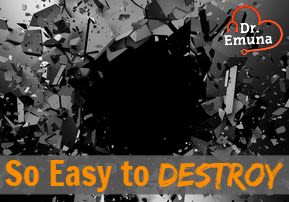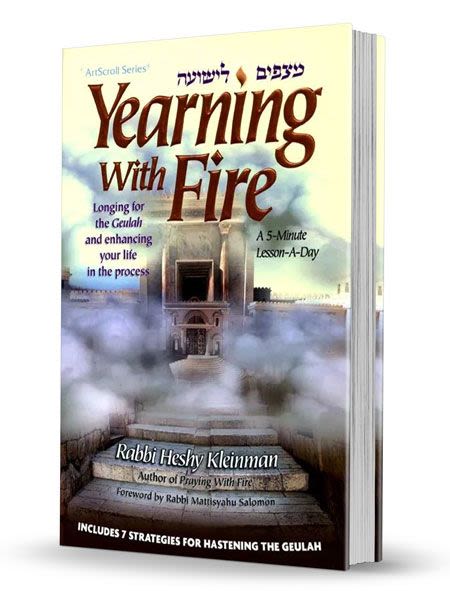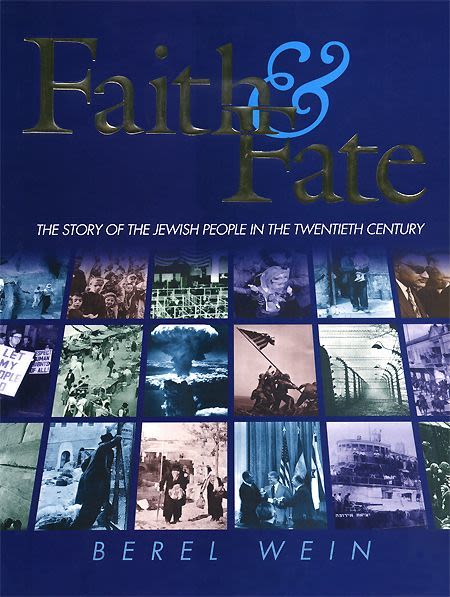
So Easy to Destroy
Why can you destroy in moments what took years to build? If G-d is all good, then why is bad so powerful? In the answer lies a message for life, and solace in troubled times…

Dennis Rosen has recently recovered enough from his terrifying accident when we was hit by a pickup truck while crossing the street on a green walk sign, Erev Shabbat about a month ago, to start writing about his experiences (you can read about it in From Ordeal to Opportunity).
What particularly struck me about his story is that on that particular morning, he of course expected to come home for Shabbat. He had no idea what was about to happen to him, and that in reality, he would come home in the afternoon before Shabbat – two weeks later. And even that happened with big miracles and an unusually fast recovery, to put it lightly. Quite frankly, he could have easily died 10 different ways in that accident, and it’s a big miracle just that he is alive!
It is a question that always bothered me: Hashem is all good, Hashem constantly wants us to build, to grow, to achieve. So, you might think that this world would be weighted towards the good, towards building and achievement – but it isn’t.
That accident took place over one split second – but the recovery will take months, and that’s very fast in this case. It takes years for a human being to grow, but a bullet can kill him in a split second. It takes years to build a building, but it can be destroyed in a matter of minutes. It takes years to train a child in the way of Torah, and in one hour on the Internet, he can fall into depths of lust and impurity from which he might never escape. He might become so addicted that already by the next Shabbat, he is already no longer guarding the Shabbat, just so he can continue his addiction. The examples are endless…
Why would Hashem create the world this way? Why is the bad, and the destructive ability of the world, so much more powerful, and why does it take so, so long to build something good?
The Big Answer
Rabbi Arush teaches that the world is weighted in this way towards bad and towards destruction, even though G-d is all good and wants us to build, create and achieve, for two reasons:
1. In order to hide Hashem's presence and give us free will to think that the bad has power.
If it was clear that it had almost no power, then it would be much harder to be fooled by it – thus reducing our merit. Which leads us right into the second reason:
2. To give us more merit, which is the reason why the world was created in the first place.
If this world was about anything besides giving us merit to earn our rewards in the Next World, then this system would make no sense. Why would Hashem Who is all good give so much power to the bad, and relatively less power to the good, to building and creating? Certainly, it should be the opposite!
However, there is a rule – according to the labor is the reward. Meaning the harder the test, the more we have to overcome, the longer we work for something – the greater our reward.
And earning reward is our entire purpose on this planet. In order to understand this in depth, you’ll need to read the first chapter of Derech Hashem – The Way of G-d (and really not just read it, but study it in depth. I studied it for more than a month, because the entire foundation of understanding emuna and your purpose in this world is explained in that chapter, and it’s extremely deep). But on one foot, G-d saw that it was best for humans to earn their reward instead of receiving everything as a handout from G-d who created them. Therefore, G-d created a world full of lies, of evil, of lusts and bad character traits, and an Evil Inclination to test us, so that when we choose the good even with all the difficulties, we will receive great rewards.
This is a similar explanation to why good things come so hard – because Hashem wants our toil, and our prayers, and our will and our yearning, in order to give us more merit for them. This is one of the explanations for why the Mothers were barren, and waited long years of tears and prayers before they had children. This is also one of the reasons why there are so many obstacles to going to Uman this year for Rosh Hashanah. The more something is worth, the more you have to put in in order to achieve it – and the rewards are well worth the effort.
If everything came so easy, we by definition wouldn’t put in so much, the achievement wouldn’t mean as much, and we would automatically receive less reward as well.
When an excellent team is paired with a loser team, the winning team doesn’t shine. They don’t put in their all, because they don’t have to. The excellent team shines when paired against a team that is almost as good, and they have to give it everything they have got to succeed.
In previous years it was relatively easy to go to Uman – who prayed to go to Uman for 30 minutes a day, or 60 minutes a day, let alone 6 hours multiple times in the past few years? Perhaps one person here or there who faced a mountain of difficulties, but definitely not hundreds of people all together for months straight!
If the Mothers were able to have children right away, they surely would still have prayed for children, but not with the same emuna and fervor. The world and the Jewish people needed those prayers, so Hashem put them into a situation that would pull it out of them. Leah also prayed and cried with incredible power, hence she earned the title “soft eyes” (from crying so much). She did put in her prayers before marrying Yaakov, instead of after – so she went on to have many children quickly and easily. She had already paid her dues, so to speak.
So, even though it seems unfair at first glance, this system really serves a very good purpose – to pull out of us more emuna, more prayer, more yearning, more goodness, more teshuva, more closeness to Hashem – i.e. to pull out of us to live our purpose in this world!
And that is certainly a good thing!
***
Rachel Avrahami grew up in Los Angeles, CA, USA in a far-off valley where she was one of only a handful of Jews in a public high school of thousands. She found Hashem in the urban jungle of university. Rachel was privileged to read one of the first copies of The Garden of Emuna in English, and the rest, as they say, is history. She made Aliyah and immediately began working at Breslev Israel.
Rachel is now the Editor of Breslev Israel's English website. She welcomes questions, comments, articles, and personal stories to her email: rachel.avrahami@breslev.co.il.












Tell us what you think!
Thank you for your comment!
It will be published after approval by the Editor.